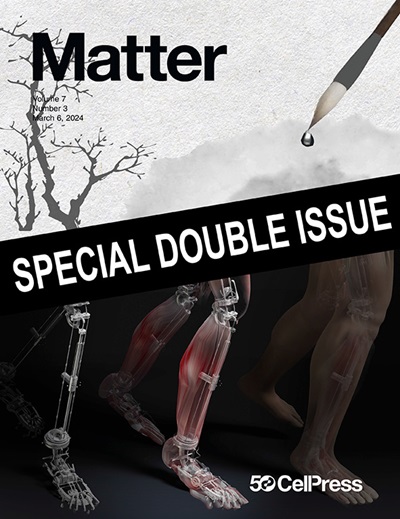面驱动折叠水凝胶孔隙驱动的精确控制
IF 17.5
1区 材料科学
Q1 MATERIALS SCIENCE, MULTIDISCIPLINARY
引用次数: 0
摘要
由形状变换驱动的微致动器通过定制的几何设计实现目标功能。然而,依赖于简单的配置限制了对变形行为的理解和自适应系统的多功能性。在这里,我们展示了几何引导驱动水凝胶孔隙通过控制折叠动力学。与随机折叠的非多面圆形孔隙不同,多面孔隙中的铰链沿着预定义的顶点直接折叠,从而可以控制孔隙的收缩程度和恢复。在经典板理论和有限元分析的辅助下,通过系统地设计关键几何因素,如形状、尺寸和邻近单元的空间接近性,有效地调节形状变换。由此产生的几何相关自适应拓扑结构可以控制微粒的捕获和顺序释放,并通过微调和局部孔隙驱动进行信息加密。这种由面驱动折叠控制的自适应微孔驱动方法为开发微致动器开辟了新的可能性,特别是在需要精确微物体操作的应用中。本文章由计算机程序翻译,如有差异,请以英文原文为准。

Facet-driven folding for precise control of hydrogel pore actuation
Microactuators driven by shape transformation achieve targeted functionality through tailored geometric designs. However, reliance on simplistic configurations restricts the understanding of deformation behavior and the versatility of adaptive systems. Here, we demonstrate geometrically guided actuation of hydrogel pores by controlling folding dynamics. Unlike non-faceted circular pores that exhibit randomized folding, hinges in faceted pores direct folding along predefined vertices, enabling control over the degree of constriction and restoration of the pores. By systematically designing key geometrical factors, such as the shape, dimensions, and spatial proximity to neighboring units, we effectively regulate shape transformation, aided by classical plate theory and finite element analysis. The resulting geometry-dependent adaptable topologies enable controlled entrapment and sequential release of microparticles, as well as information encryption through fine-tuned and localized pore actuation. This approach to adaptive micropore actuation controlled by facet-driven folding opens new possibilities for developing microactuators, particularly in applications requiring precise microobject manipulation.
求助全文
通过发布文献求助,成功后即可免费获取论文全文。
去求助
来源期刊

Matter
MATERIALS SCIENCE, MULTIDISCIPLINARY-
CiteScore
26.30
自引率
2.60%
发文量
367
期刊介绍:
Matter, a monthly journal affiliated with Cell, spans the broad field of materials science from nano to macro levels,covering fundamentals to applications. Embracing groundbreaking technologies,it includes full-length research articles,reviews, perspectives,previews, opinions, personnel stories, and general editorial content.
Matter aims to be the primary resource for researchers in academia and industry, inspiring the next generation of materials scientists.
 求助内容:
求助内容: 应助结果提醒方式:
应助结果提醒方式:


